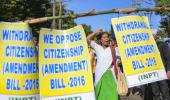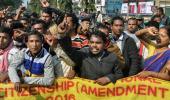On December 4, the Union Cabinet cleared the Citizenship (Amendment) Bill that seeks to grant citizenship to non-Muslim refugees from Pakistan, Bangladesh and Afghanistan if they faced religious persecution there.
The government intends to introduce the bill in Parliament’s ongoing Winter Session soon, even as protests against the contentious bill have been continuing in the north-east, including Assam, which has been large-scale migration and illegal infiltration.
What is this legislation and why is it so controversial?

>> What is the Citizenship (Amendment) Bill?
First things first. The legislation seeks to provide Indian nationality to six communities -- Hindus, Sikhs, Buddhists, Jains, Parsis, and Christians -- fleeing persecution from Pakistan, Afghanistan and Bangladesh. The bill amends the Citizenship Act, 1955 to make illegal migrants in the select categories eligible for citizenship.
Under The Citizenship Act, 1955, one of the requirements for citizenship by naturalisation is that the applicant must have resided in India during the last 12 months, as well as for 11 of the previous 14 years.
The amendment relaxes the second requirement from 11 years to six years as a specific condition for applicants belonging to these six religions, and the aforementioned three countries.
>> What happened to the bill?
The Citizenship (Amendment) Bill, 2016 was tabled in Lok Sabha on July 19, 2016 during the first term of the National Democratic Alliance government. The bill was referred to a joint parliamentary committee on August 12, 2016.
The JPC, after studying the bill, submitted its report on January 7, 2019, and on January 8, 2019 it was passed in the Lok Sabha.
Owing to massive protests against the bill, the Rajya Sabha was adjourned on February 13, 2019, without the Bill being tabled.
The bill will now be re-introduced in this Winter Session of Parliament.
>> What is the controversy around it?
The government has stated that the legislation aims to grant citizenship to minorities who have faced religious persecution in Muslim-majority foreign countries.
However, the Opposition has attacked the government for leaving out Muslims, terming it a violation of Constitutional provisions.
According to experts on the issue, the Bharatiya Janata Party-led NDA government is unhappy with the Assam National Register of Citizens exercise as a large number of Hindus have been excluded from the final list while a large number of illegal foreigners’ names have been included.
The northeastern states too have flagged their concern over the CAB. So much so, that the area has witnessed massive protests for more than a month.
Their concern is that a number of illegal Bangladeshi migrants will become citizens, leading to a change in demographics, loss of livelihood opportunities, and erosion of the indigenous culture.
>> Which parties are opposing the Citizenship (Amendment) Bill?
The Congress, Trinamool Congress, the Dravida Munnetra Kazagham, Samajwadi Party, Rashtriya Janata Dal, the Left and the Biju Janata Dal have expressed reservations.
The BJP's ally -- the Asom Gana Parishad -- has warmed up to the bill after the government assured them of changes in the bill.









 © 2025 Rediff.com -
© 2025 Rediff.com -